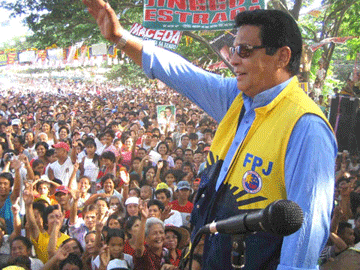G.R. No. 161434 March 3, 2004
MARIA JEANETTE C. TECSON and FELIX B. DESIDERIO, JR. vs.COMELEC, FPJ and VICTORINO X. FORNIER,
G.R. No. 161634 March 3, 2004
ZOILO ANTONIO VELEZ vs.FPJ
GR. No. 161824 March 3, 2004
VICTORINO X. FORNIER, vs. HON. COMMISSION ON ELECTIONS and FPJ
Facts:
Petitioners sought for respondent Poe’s disqualification in the presidential elections for having allegedly misrepresented material facts in his (Poe’s) certificate of candidacy by claiming that he is a natural Filipino citizen despite his parents both being foreigners. Comelec dismissed the petition, holding that Poe was a Filipino Citizen. Petitioners assail the jurisdiction of the Comelec, contending that only the Supreme Court may resolve the basic issue on the case under Article VII, Section 4, paragraph 7, of the 1987 Constitution.
Issue:
Whether or not it is the Supreme Court which had jurisdiction.
Whether or not Comelec committed grave abuse of discretion in holding that Poe was a Filipino citizen.
Ruling:
1.) The Supreme Court had no jurisdiction on questions regarding “qualification of a candidate” for the presidency or vice-presidency before the elections are held.
“Rules of the Presidential Electoral Tribunal” in connection with Section 4, paragraph 7, of the 1987 Constitution, refers to “contests” relating to the election, returns and qualifications of the “President” or “Vice-President”, of the Philippines which the Supreme Court may take cognizance, and not of “candidates” for President or Vice-President before the elections.
2.) Comelec committed no grave abuse of discretion in holding Poe as a Filipino Citizen.
The 1935 Constitution on Citizenship, the prevailing fundamental law on respondent’s birth, provided that among the citizens of the Philippines are “those whose fathers are citizens of the Philippines.”
Tracing respondent’s paternal lineage, his grandfather Lorenzo, as evidenced by the latter’s death certificate was identified as a Filipino Citizen. His citizenship was also drawn from the presumption that having died in 1954 at the age of 84, Lorenzo would have been born in 1870. In the absence of any other evidence, Lorenzo’s place of residence upon his death in 1954 was presumed to be the place of residence prior his death, such that Lorenzo Pou would have benefited from the “en masse Filipinization” that the Philippine Bill had effected in 1902. Being so, Lorenzo’s citizenship would have extended to his son, Allan—respondent’s father.
Respondent, having been acknowledged as Allan’s son to Bessie, though an American citizen, was a Filipino citizen by virtue of paternal filiation as evidenced by the respondent’s birth certificate. The 1935 Constitution on citizenship did not make a distinction on the legitimacy or illegitimacy of the child, thus, the allegation of bigamous marriage and the allegation that respondent was born only before the assailed marriage had no bearing on respondent’s citizenship in view of the established paternal filiation evidenced by the public documents presented.
But while the totality of the evidence may not establish conclusively that respondent FPJ is a natural-born citizen of the Philippines, the evidence on hand still would preponderate in his favor enough to hold that he cannot be held guilty of having made a material misrepresentation in his certificate of candidacy in violation of Section 78, in relation to Section 74 of the Omnibus Election Code.
###
Also, please follow our community for more updates : FACEBOOK PAGE and WORDPRESS

